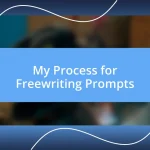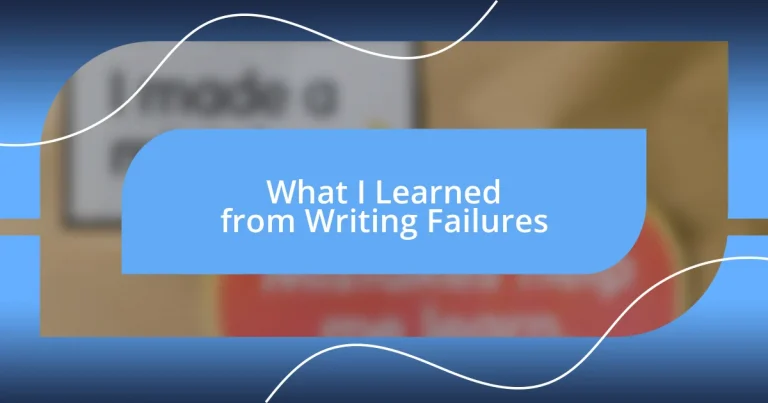Key takeaways:
- Failure can be a powerful teacher, prompting growth and a deeper understanding of oneself and one’s audience.
- Common reasons for writing failures include lack of clarity, procrastination, and ignoring audience needs, each serving as learning experiences.
- Building resilience through vulnerability, sharing experiences, and setting achievable goals can help overcome setbacks and lead to future writing success.
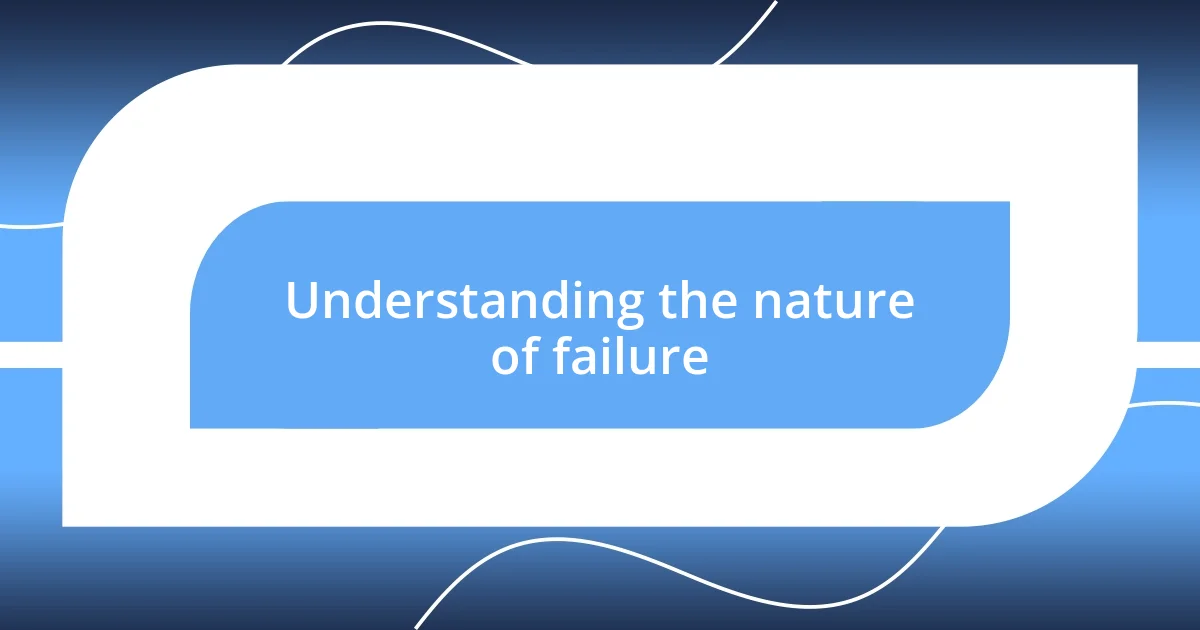
Understanding the nature of failure
Failure is often perceived negatively, but for me, it feels like a teacher in disguise. I once poured my heart into a short story, only to receive harsh criticism. Instead of being crushed, I realized that constructive feedback was a stepping stone on my journey as a writer, prompting me to improve my craft. Isn’t it amazing how what initially feels like a setback can illuminate the path forward?
When I think about my writing failures, I see them as essential markers on my journey. There was a time when I submitted an article that I believed was my best work, only to find that it was met with disinterest. I felt disheartened, but that experience ignited a fire within me to dig deeper into my audience’s preferences. Isn’t it interesting how failure can drive us to better understand ourselves and our readers?
The nature of failure is intrinsically linked to growth. I’ve learned that every stumble is an opportunity for reflection. I often ask myself, “What can I learn from this?” This simple question has been a game-changer, helping me embrace failure as a vital part of the writing process. By reframing failure in this way, I find it easier to move forward with resilience and determination.
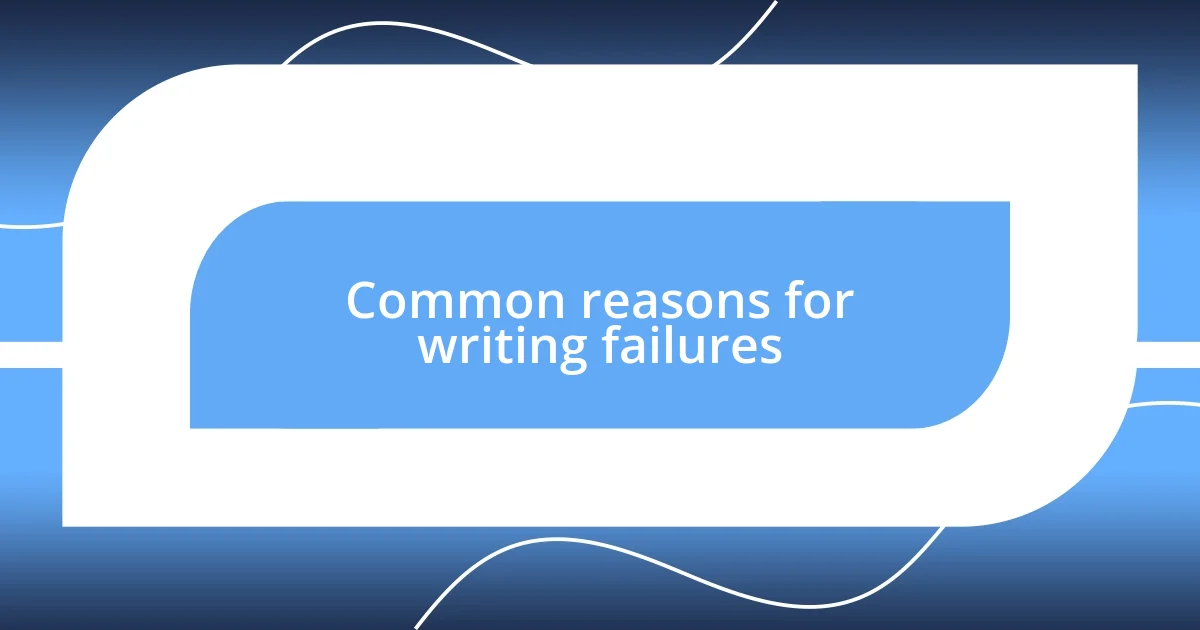
Common reasons for writing failures
When I look back at my writing journey, one glaring reason for failure often stands out: lack of clarity. I remember writing a blog post that meandered without a clear message, leaving readers confused instead of engaged. That taught me the importance of having a well-defined purpose for each piece. Without clarity, even the most passionate pieces can fall flat and fail to connect.
Another common pitfall I’ve encountered is procrastination. I once left a project until the last minute, which resulted in a rushed and poorly thought-out article. The quality suffered, and I received feedback that reflected my hasty approach. It became clear that giving myself adequate time to craft my thoughts is crucial for producing work I’m proud of.
Lastly, ignoring the audience can lead to disappointment. There was a time when I wrote purely for myself, neglecting what my readers craved. The piece didn’t resonate, and the feedback was disappointing. Through that experience, I realized that audience awareness is key; understanding their needs and interests can significantly elevate my writing and drive engagement.
| Reason for Failure | Personal Experience |
|---|---|
| Lack of Clarity | Wrote a meandering blog post, which confused readers and missed its mark. |
| Procrastination | Rushed an article last minute, resulting in poor quality and disappointing feedback. |
| Ignoring the Audience | Wrote for myself and missed connecting with readers, leading to disappointing results. |

Lessons learned from my experiences
Reflecting on my experiences, I’ve discovered that embracing vulnerability can be incredibly liberating. There was a time I hesitated to share my drafts, fearing judgment and rejection. Yet, when I finally opened up to a trusted writing group, their perspectives not only eased my worries but also filled my work with new creativity. That moment taught me that camaraderie and honest critique can transform uncertainty into growth.
- Sharing drafts invites fresh perspectives.
- Vulnerability fosters community support.
- Constructive criticism enhances creativity.
Moreover, I’ve learned the value of persistence in the face of setbacks. I remember submitting a story to several magazines, only to receive rejection after rejection. Each time, it stung a little more, but I found solace in the fact that even renowned authors faced the same struggle. I began to see each rejection as a stepping stone, propelling me to refine my skills and try again, ultimately leading me to publications I never thought I’d achieve.
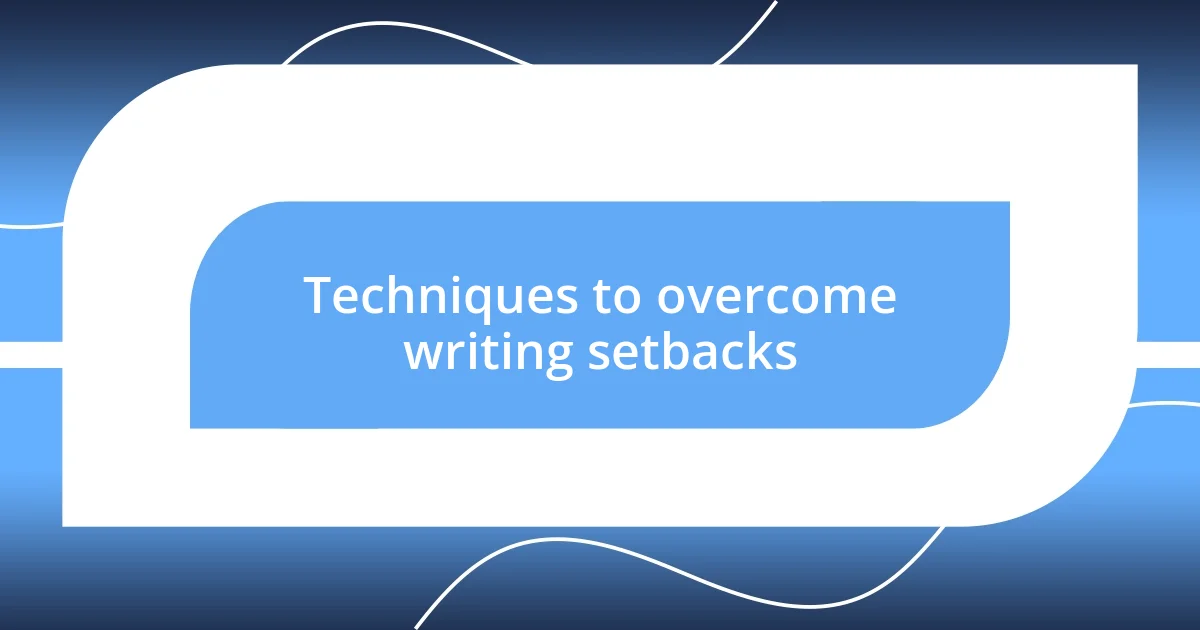
Techniques to overcome writing setbacks
To navigate writing setbacks, I’ve found that establishing a structured routine can be a game-changer. When I started dedicating specific hours each day solely for writing, my productivity surged. It’s surprising how a consistent schedule not only helps combat procrastination but also creates a mindset geared toward creativity. Have you ever felt that wave of inspiration when you sit down at the same time each day? I know I have, and it can be quite exhilarating.
Another technique that’s worked wonders for me is breaking my writing into smaller, manageable tasks. Instead of overwhelming myself with the daunting idea of completing an entire essay or article, I focus on one section at a time. For instance, when I tackled a complex piece recently, I set a goal to write just the introduction first. This approach allowed me to celebrate small victories along the way, making the entire process feel less intimidating. Might you try this technique the next time you’re faced with a hefty writing project?
Lastly, engaging with fellow writers has proven to be invaluable. I once joined a local writing group, hoping to get feedback and find camaraderie. The honest discussions we shared not only revitalized my passion for writing but also offered fresh perspectives on my work. Think about your own writing journey—could connecting with others spark a renewed sense of purpose and creativity? I truly believe that collaboration can transform our individual challenges into shared growth.
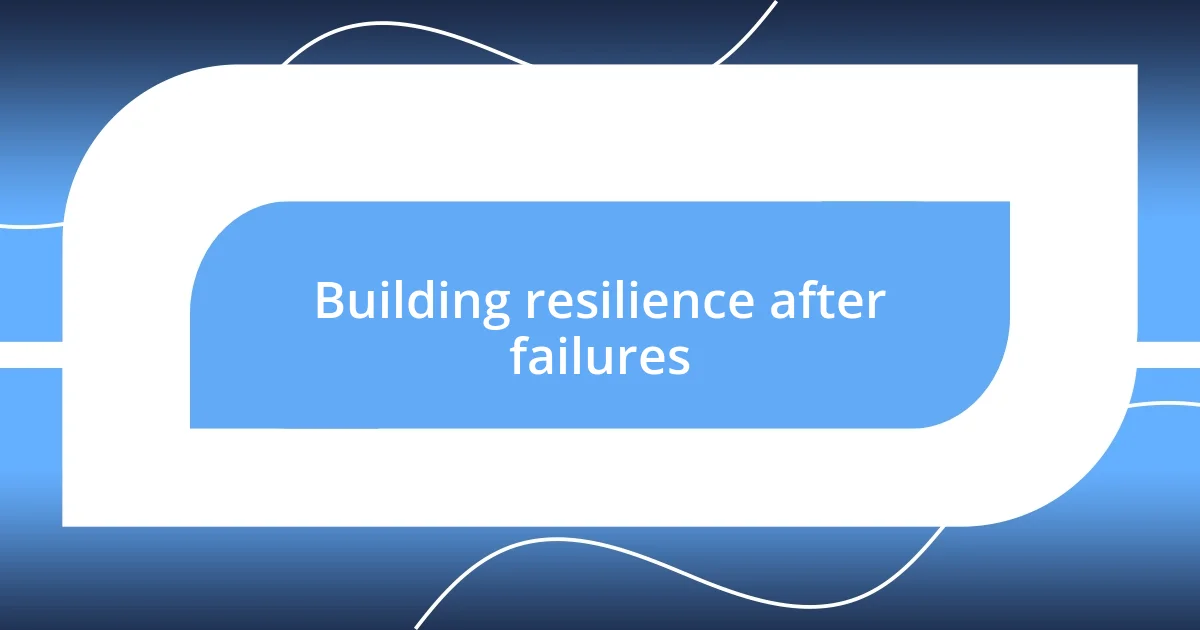
Building resilience after failures
Building resilience after failures is a crucial aspect of a writer’s journey. I vividly remember a time when I poured my heart into a novel draft, only to receive overwhelmingly critical feedback from beta readers. At first, I was crushed—the words felt like blows to my confidence. However, it pushed me to evaluate my work more critically and ultimately led to significant improvements. Has anyone else felt that sting of disappointment? I certainly have, and it’s this very discomfort that often opens the door to growth.
In embracing the challenges that come with writing failures, I discovered the importance of self-compassion. After experiencing a particularly devastating rejection of what I believed was my best piece, I took a step back. Rather than spiraling into self-doubt, I allowed myself to acknowledge the effort I had put in. I treated myself to a day of relaxation, reflecting on why I loved writing in the first place. It was a small act of kindness that reminded me that every setback is not a reflection of my worth but a part of the journey. How do you practice self-kindness in the face of rejection?
I’ve also learned that resilience often manifests through reinvention. One writing coach I worked with encouraged me to pick apart my failures, not to dwell on them but to discover patterns in my errors. I started keeping a ‘failure journal,’ noting down what didn’t work and how I could improve. This simple yet powerful tool helped me transform painful experiences into actionable insights. Have you ever thought about turning your failures into a learning log? It can be incredibly freeing and could change the way you approach your writing challenges.
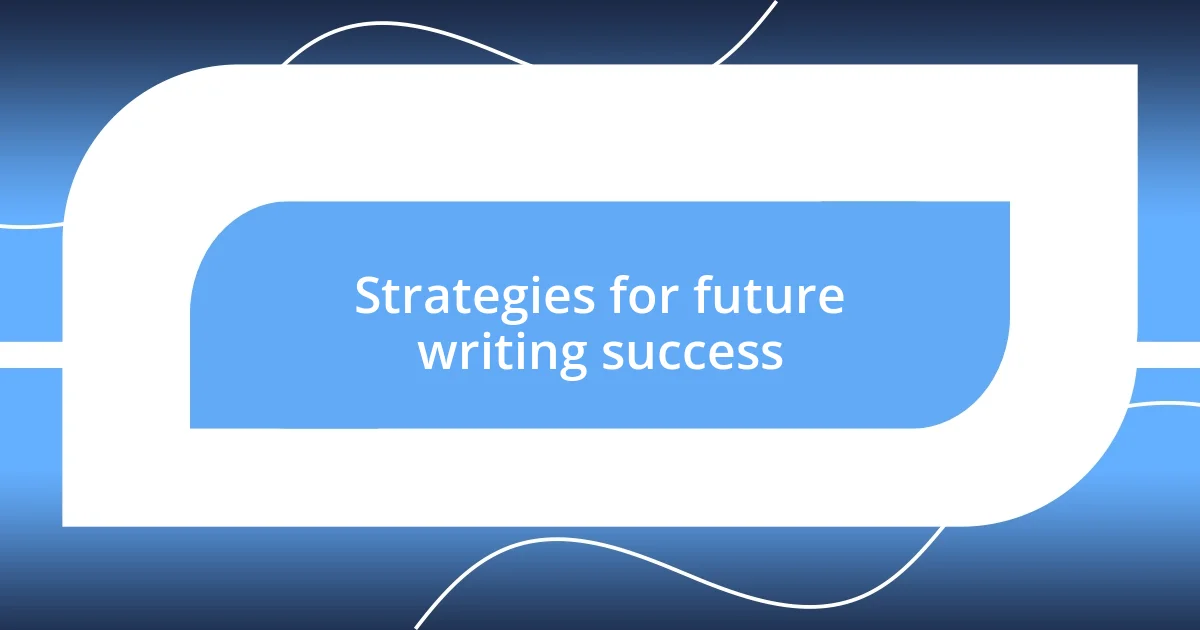
Strategies for future writing success
One significant strategy I’ve embraced for future writing success is the power of feedback loops. I once shared a draft with a close friend, and their feedback revealed blind spots I’d never noticed. It felt uncomfortable, but their insights helped me reshape my narrative entirely. Isn’t it fascinating how someone else’s perspective can highlight aspects you might miss? I encourage you to seek out constructive criticism—it can be the catalyst for your work to evolve into something truly remarkable.
Another approach that has transformed my writing process is setting specific, achievable goals. When I decided to aim for writing just 300 words a day, it felt manageable, and surprisingly, it led to much more than I anticipated. In fact, there were days when I got into the flow and ended up writing over 1,000 words! Isn’t it liberating to realize that small, intentional steps can lead to substantial achievements? By breaking down larger ambitions into bite-size portions, I found that consistency and progress became my everyday companions.
I’ve also started to lean into my personal interests more actively. There was a time when I’d hesitate to incorporate my passions into my writing, fearing it might alienate readers. However, during a lull in my creativity, I wrote a piece about a hobby I adore, and the enthusiasm it sparked was contagious. Have you ever felt a surge of energy when you write about something you truly love? Tapping into my interests reinvigorated my writing and reminded me of the joy it can bring. By prioritizing what excites you, I believe you not only enhance your own experience but also connect authentically with your audience.

Sharing insights with others
I’ve found that sharing my struggles with peers has often led to unexpected insights. For instance, during a local writing group session, I opened up about a manuscript that never quite resonated with readers. To my surprise, others chimed in with similar experiences, and together we uncovered common themes in our failures that we hadn’t recognized before. Have you ever noticed how shared vulnerabilities can create a powerful bond? It’s comforting and enlightening to know that we’re all navigating these ups and downs together.
Whenever I speak at writing workshops, I make it a point to discuss my failures candidly. One session, I remembered facing rejection after rejection from literary agents—each email felt like another nail in the coffin. I could see my audience lean in, their expressions shifting from concern to understanding. It struck me that by exposing my shortcomings, I was also providing a pathway for others to embrace their own setbacks. Have you experienced that sense of relief in hearing someone else’s struggle? It can be a reminder that failure is not the end; rather, it’s part of the tapestry of growth.
I also cherish the moments when fellow writers reach out after I’ve shared my insights about failure. One young writer told me how my story about learning from my worst rejection inspired her to tackle her own submissions with renewed vigor. It was a heartwarming moment, realizing that my past challenges could serve as a source of encouragement for someone else’s journey. Isn’t it incredible how our experiences can resonate with others, often in ways we could never have imagined? That’s the beauty of sharing—it’s about transforming personal pain into collective strength.







